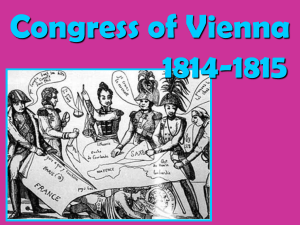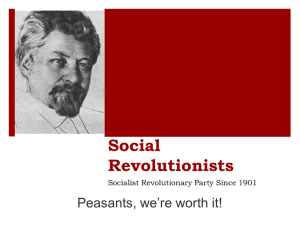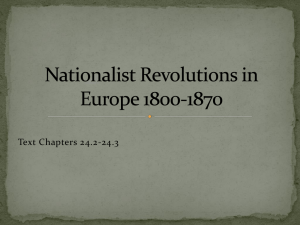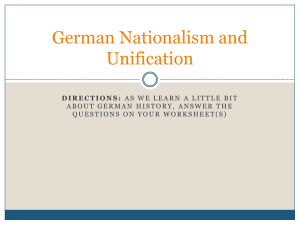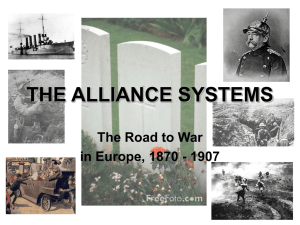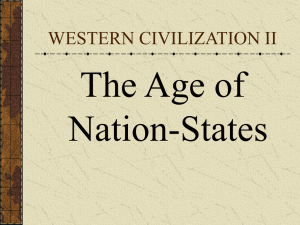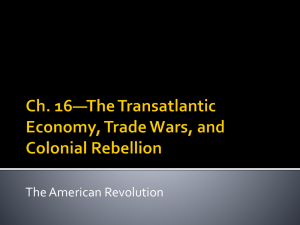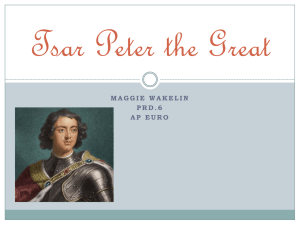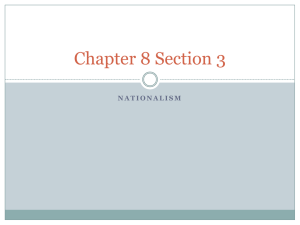Unit 3 Unification - Kenston Local Schools
advertisement
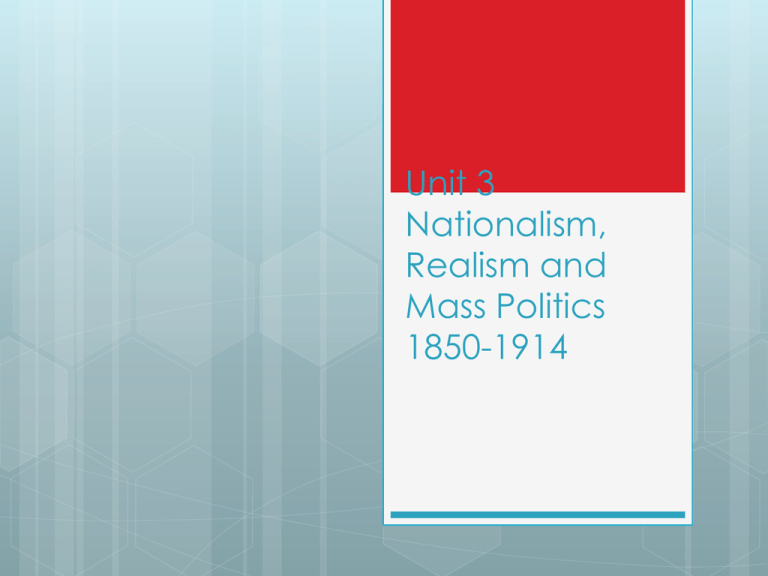
Unit 3 Nationalism, Realism and Mass Politics 1850-1914 Europe in 1850 Revolutions of 1848 were failures b/c people couldn’t agree on goals. There were growing rifts between classes. Middle classes were growing more conservative now that they had been included in political systems. Idealism discredited- revolutionaries less optimistic- gov’ts getting used to repressing. Talks are less about what OUGHT to be and more about what IS (realism) Movement towards mass politics as suffrage expanded Nationalism no longer just one of the ideologies- accepted as a major force- even by conservatives. Idealism= impracticality. Instead, focus on REALPOLITIK- accomplish practical goals through practical means- work step by step, don’t assume you can rebuild the world overnight. France Under Napoleon III Second Republic December 1848 Louis Napoleon elected president. His “Magic Name” (his uncle’s) reassured voters in times of turbulence. Main act as president seemed to be trying to gain popularity with the people. 1851- asked for a 2nd term (against const) and was denied Louis Napoleon had lived most of his life outside of France- had few “enemies” Time had made Napoleon the hero of France. Louis Napoleon manipulated voting and blamed legislature for corruption Seen as a symbol of stability- appeared liberal enough, conservative in areas, and against radicalism in all forms. Plebiscite 1851- Napoleon used the military to seize control of the gov’t. Granted universal manhood suffrage (1st country to do so) and used it for his uncle’s old trick- a vote on his actions. Overwhelmingly (97%) voted him emperorcrowned December 1852 Second Empire Nap III synthesized economic liberalism (popular with middle class), nationalism, and authoritarian rule (popular with conservatives). Extravagant court- firm control of legislature. But allowed the vote, and frequently asked voters input. New imperial aristocracy created from wealthy businessmen. Gave control of Secondary Education to gov’trather than church. Gave unions right to strike (popular with radicals) Economic Prosperity Believed gov’t should promote economy. Cleared out slums, built better houses, new sewers, RR, Grand pubic buildings- which provided jobs, improved commerce, created a better standard of living, and prevented revolution Moved towards free trade, lowering tariffs, doubling exports. Signed trade agreement with old rival, England. Credit Moblier- a gov’t run corporate bank for investing Baron George von Haussmann Redesigned Paris to show beauty and provide political strength (streets too wide for barricades, lots of ways to get places) Paris 1st modern Capital city- a planned city International Affairs Wanted to reinvigorate French power, reclaim French glory, and show off too. Challenged Russia and Austriaattempted to make Mexico a monarchy Actually a weak area for him. Lots of posturing, but he didn’t have Napoleon I’s brilliance on or off the battlefield. Many of his reforms done to divert attention from one of his foreign policy blunders- like sending his cousin Maximillian to try to take over Mexico. Crimean War 1853-1856 The beginning of a turning point in European Historycracks begin to appear in the notion of balance of power. Causes Ottomans restricting Christian visitors to the Holy Land (same issue as 1095 btw)- made treaty to stop doing it for RC. Russian Orthodox demand same treatment- and says it is occupying territory in Crimea (Black Sea) until demands met Really about expansion of territory for Russia and weakening of Ottomans Crimean War (II) Spark: Russian expansion into Black Sea area. French and British feared Ottoman would collapse entirely and Russia would expand all the way through Balkans to Mediterranean. Big shock that Eng/France support Muslims Technology and War Heading towards modern weapons, this war has a much higher casualty rate than any which have come before. Begins shift away from cavalry (used to break lines- but don’t often carry major guns) towards artillery. Repeating rifles Sevastopol- largest battle Russia WAY behind in tech- they get spanked- very embarrassing, and a wake up call for them- begin attempts at modernization Florence Nightingale A major cause of death from wounds was infection. Florence was a British nurse who pioneered standards of treatment to prevent further damage Results of War Russia was forced to pull back- which was a surprise, their size had made them so scaryturns out they weren’t. Concert of Europe dead- all nations are out for their own gains Peace of Paris Russia lost mouth of Danube and territory that became Romania. Black Sea became Neutral- Ottoman Empire “saved” Italian Unification Italy had not been unified since classical age. From Mid. Ages had been collection of “city states”. Renaissance had been a high pointbut had become a battleground for competing powers. Hapsburgs in North, Pope in Center, Bourbons in South. Only Sardinia really “independent” Early Attempts: Mazzini (the Visionary) Giuseppe Mazzini and Vincenzo Gioberti led 1st attempts by Carbonari to unify Italy. (unsuccessful) Mazzini wanted a Republic, Gioberti wanted a state led by the pope Unable to pull people together- both represented ideas that were too radical and idealistic- more romantic that realistic Sardinia Victor Emmanuel II- a constitutional monarch, had become the best option for leading Italy to unity. A liberal state, with Econ strength- strong enough to lead without making others feel they are being steamrolled Camillo di Cavour Chief minister to king (the Statesman) Victor Emmanuel of Sardinia. Practicalwilling to work step by step to achieve goalsbrought middle class in. Started with North to “enlarge Sardinia” rather than create “Italy” 1859 Used war with Austria (aided by Nap iii) to bring people together. Used available Media “Il Risorgimento” Newspaper (named for Mazzini’s idea, but more practical) to spread propaganda. By 1860 Lombardy, Tuscany, Parma and Modena have become part of Sardinia Plombiere Napoleon iii had promised Sardinia help with Austria – and they would split the territories (Savoy and Nice would go to France) Secret pact made at Plombieres But as conflict was ending- France backed out of support to help Italy gain Venice (decided it would be too difficult) and made sep. peace with Austria. Cavour felt betrayed Giuseppe Garibaldi (the Revolutionary) Charismatic- the last of the Romantics. Had fought in 1848. Republican- but practical enough to compromise for unity. Began in Sicily and Naples- where he defeated the Bourbons and began to head north. RED SHIRTS: Garibaldi’s revolutionaries. Defeated 2 professional armies in south Unification Cavour and Garibaldi met in Naples in Feb 1861. Victor Emmanuel declared King of Italy. Venice joined 1866, Rome 1870 (with creation of Vatican for pope) Process not radical or democratic, Cavour steered nationalism in a conservative direction Pope was a sticky pointFrance was biggest support in him keeping the center of Italy- but After Franco-Prussian war they could not longer support. Biggest problem after unification was integration- the North was semi-industrialized, south stagnant and agrarian. Unification of Germany Frankfurt Assembly of 1848 had failed. Who will Germany? 2 choices, Austria or Prussia- both of whom wanted the job. Austria in decline, Prussia on the risethey get the job Grossdeutsch United Germany with BOTH Austria and Prussia as part of country. Became increasingly unrealistic Kleindeustch Germany with Prussiabut no Austria. This is the practical plan, and this is a practical age Rise of Bismarck Wilhelm I took power in 1861- and was inspired by Sardinia’s success with Italy. Made Otto Von Bismarck (Junker- a big fan of strength) his Prime Minister Together they plotted to create “Germany” with strong military, economic, and political power. (It’s not just about making a country- making a world leader) Conservative Nationalism Realpolitik Unification will come not through idealism and brotherhood, but by working with a plan, moving in steps, and keeping the ultimate goal in sight. Defines the politics of the age Gap Theory: Wilhelm worried about losing powerBismarck says no problem, since King grants constitution, he is ultimate power, not legislature Diplomatic- Bismarck only fought when he HAD toand only when he knew he would win “Blood and Iron” Bismarck’s most famous manifestothat it is not speeches and resolutions that accomplish goals- but sacrifice and actionand he is going to get this DONE War as a means to Unify Borrowed the idea from Italy- use a series of small (easily won) wars to bring people together. War with Denmark 1863 Duchies of Schleswig and Holstein claimed by both Denmark and Prussia. Bismarck convinced Austria to go to war with himthey would each take a territory. Won easily….and Bismarck was already planning to use the result to provoke his next war- with Austria. War with Austria Seven Weeks War 1866 Used Austrian possession of Holstein to provoke tension and start war. Prussia has most advanced military in world at that point- spanked old fashioned Austria. Makes Prussia decisive leader of German affairs Prussia made alliances with Fr, Rus, It before war to keep them out. 1st time RR key for troop movement Create North German Confederation- with a 2 house legislature (Reichstag) for all Ger. States- with universal manhood suffrage Franco Prussian War (Part 1) 1870-71 Southern German states are still more inclined to Austria (they are RC)- but Bismarck knew that conflict with France would draw them in. (and that Nap iii was all talk, no action) Plus- they’d really like Alsace and Lorraine (between France and Germany Ems Dispatch Intentional snub to provoke war. Bismarck boasted about kicking the French ambassador out of GermanyInfuriated the French so they declared war (which made them the “aggressors”) Franco Prussian War (Part 2) South jumps on the German bandwagon- and we have a whole country. Bismarck was right about Nap iii- he is a poor commander, and won’t appoint good ones (he’s afraid they will make him look bad) Prussia doesn’t just beat France, the humiliate them- esp. at Battle of Sedan- where they capture Nap iii. Lay siege to Paris- and take the capital. Shocking to other countries how powerful this new “Germany” is- they came out swinging. German Empire Wilhelm I declared “Kaiser” of German Empire in Hall of Mirrors at Versailles. Harsh treaty for France- Ger gets Alsace/Lorraine, and France has to pay reparations for “Starting” the war Germany now most powerful nation on Continent Victory of Conservative Nationalism Didn’t change gov’t structure from 1866 (Reichstag etc…) Now that he had his country- Bismarck used Liberal reform (Kulterkampf: vote, pensions, education) to keep people happy and prevent revolution Nation Building 1850-1914 Changing the Balance of Power in Europe- starting to get competitive again Mass Politics Ordinary people have increasing nationalism- by 1914 universal manhood suffrage was typical. Welfare state will begin to emerge- 1st in Germany, than Britain and elsewhere. Increasing education was supported by the gov’t. As more people got involved in politics, became the job of politicians to “fool” them- manipulating voters for their own ends France After Napoleon III France is once again chaotic and divided on whether to be a Republic or a Monarchy. Est. 3rd Republic at end of Franco-Prussian War- Adolf Thiers (conservative) elected President by National Assembly 1871 but…. Radicals are gaining stronger voices saying it was clear the usual ways are ineffective Paris Commune Radicals created a municipal gov’t separate from the rest of France before the war even ended. Socialist- and a threat National Assembly sent in the army to bombard the city70,000 killed in 7 day siege of Paris Marxists loved the idea of the commune- the people taking over. But it drove the National Assembly and Thiers into becoming more conservative to suppress radicals Third Republic Est 1871- didn’t really take full power until 1875. Legislature: Chamber of Deputies (chosen by UMS) Senate (chosen indirectly) Executive: Chosen by both houses of Leg. Stabilized France, but was inefficient and seen as weak. (Failure to complete Panama Canal)- Lots of coalition gov’ts joining together and falling apart. Still- longest since 1789, lasted until 1940 Boulanger Crisis 1887-1889. George Boulanger gained confidence of military and tried to use it to overthrow gov’t. Failed (he fled) but still indicative. Dreyfus Affair 1894 Biggest crisis to hit Republic. Capt. Alfred Dreyfus (a Jew) accused (falsely) of selling secrets to the Germans. Monarchists (and Church) used it to discredit Republicans (who were on an anti-church kick at the time) Dreyfus sentenced to Devil’s Island- BUT in 1896 new evidence came to light that Dreyfus innocent- real culprit Major Frederick Esterhazy, and that army had forged documents to frame Dreyfus b/c of anti- semitism Emile Zola “J’Accuse”- 1898 newspaper article outlining the events and cover up. (including that gov’t knew all along who was guilty) Zola arrest for Libel- left for England Scandal split households, caused riots Radicals supported Republic (against monarchists) led to an alliance between Republicans and Socialists. Monarchists discredited Dreyfus pardoned 1899. Austria in Decline They have been slipping for 200 years. Not industrialized, not unified, constantly on the brink of chaos (weakened by nationalism where others are strengthened by it). Suffrage limited until 1907, legalized discrimination *esp anti- semitism. Language a particularly divisive issue- schools/gov’t required use of German, which annoyed other ethnicities Hapsburg Empire After 1848 Austria is trying to pull themselves together under Fran Joseph I. He stressed uniform laws/taxes for empire, modest industrialization (too little too late) 1860- proposed a new constitution which allowed regional assemblies (pacify nationalists) But that created even more tension- so abandoned in favor of…. Dual Monarchy 1867 After loss to Prussia (in 7 weeks war) Austria was particularly weak. Hungarians gave an ultimatum, revolution or Augsleich: home rule for Hungary. (still IN empire, but Autonomous) Emp accepted, fatal blow- now they can never centralize Pan Slavism Hungarian success only made other nationalistic demands stronger. Many of the nationalities of empire were Slavic (as opposed to Germanic) began to discuss how to work together for mutual success. Supported by Russia, who wanted to weaken Austria (and step in to gap) Russia: The Reform Era Alexander II- Tsar after Crimean War- most liberal since Catherine the Greatdecides Russia HAS to modernize Provided education for soldiers to increase literacy, Relaxed censorship. Emancipation of Serfs 1861(Russia last here, Even Austria had done it in 1848 Emancipation Act 1861 90% of Russia peasants serfs- and not happy about it. Could be sold by nobles into army, or as factory workers. Act “freed” serfs, but had to buy land in order to stay where they were (free to leave, but not many places to go) No political rights. Most end up on Mirs- land grants owned by the gov’t, and run by nobles- and generally even worse off than they were before Zemstvos Alex’s reforms created local political councils to replace noble control over population- 1st opportunity for ANY pol. Participation. Only had influence in local issues- generally run by tiny middle class. Had no ability to limit Tsar or central gov’t Industrialization No capitalist middle class- industry came from gov’t (like westernization had from Peter) Russia has massive resources- but they are in the middle of nowhere (Literally) Trans Siberian RR key for making resources available- and for exporting them. (RR begun 1860, TS RR 5000 mi completed 1880) Factories built in St. Petersburg and Moscow with $$ from western investment (encouraged, in 1900 ½ of Russia’s factories are foreign owned) Industrialization will bring Marxism to Russia Count S Y Witte Oversaw industrialization in the 1890s. Aggressively courted foreign investment. Built 35,000 mi of RR by 1900, made Russia 4th largest steel producer, and exported ½ of world petroleum- but they didn’t OWN the econ. Political Unrest Russia is becoming increasingly unstableeven with reform (in fact, perhaps because of reform) Reform encouraged demandsbringing up new nationalist, liberal ideas. Still had HUGE econ problems1/3 of farmland not used, tremendous unemploymentand no gov’t help. Humiliated AGAIN in RussoJapanese war of 1905 Russia was FAR more radical than other places- there was no other option. Radical movements gained ground all through late 1800s Intelligentsia The (small) group of educated- attached to universities. Felt alienated, advocated terrorism to achieve change. Considered the rest of Europe MORALLY inferior to Russia- but the Tsar was stuck in the pastcreating a stumbling block to Russian greatness. Nihilists: intellectuals who believed in nothing but science. That the social order should be wiped out Anarchists Opposed to ANY formal gov’t. Used terrorism and assassination to create change. Killed Alex II in 1881 (felt he moved too slowly) Bombed his carriage. Mikail Bakunin influential Alexander III Tsar 1881-1894 Reactionary. Saw assassination as fault/result of reform. Called for “Autocracy, Orthodoxy & Russification” Encouraged Pogroms (Jews blamed for radical groups) Only fired radicals up further. Marxism/Leninism Marxism popular with Intelligensia- but a Marxist revolution was supposed to be led by a proletariat class- and Russia didn’t have one. Vladimir Ilyich Ulyanov (Lenin) has solution- “Democratic Centralism”. A small “vanguard” can led a proletariat revolution in the name of the people (Bolsheviks) and hold power until the people are ready to lead themselves Nicholas II The last Tsar 18941917. Alex III also killed. Nicholas was much like Louis XVI, a gentle, family man, who was completely unsuited for his times. Foolish, not firm, easily led into bad choices (Rasputin) Revolution of 1905 Sparked by humiliation of defeat in R-J war. Bloody Sunday: Jan 1905 200,000 workers marched peacefully on the Winter Palace to present a petition to the Tsar requesting reform (he wasn’t there) Army slaughtered marchers in cold blood. But rev. failed b/c army backed Tsar Created a general strike which lasted from Jan to Oct and paralyzed econ. Tsar forced to cede a constitution w/an elected legislature: DUMA. (only advisory, no lawmaking power) Reforms were too little too late to satisfy radicals. Russo Japanese War 1904-1905 Russia had a sphere of influence in Manchuria- planned to invade and imperialize Korea- but so did Japan. Jap/Russia fought over territory- and Japan SPANKED Russia (1st time a non Euro won since Crusades) Humiliating- they turn from Asian expansion and focus on Balkans instead Britain: Towards Democracy Women’s suffrage a Of all the countries of Europe- the 2nd half of the 19th cen was smoothest for England Reforms comegenerally peacefully through popular will, not revolution. Economic prosperity encouraged Parliament towards liberal refomr significant movement for the 1st time in US and Eng- suffragettes largely from middle class Evolution of Monarchy Queen Victoria ruled from 1837-1901 (England’s longest ruling monarch) She and her German husband Albert were models of propriety and family living. Queen built an image above politics and a symbol of national unity. Less political power than other monarchs, but more influence Victorian Age This entire era in British history is named for the Queen. The middle classes loved her as a symbol of their values: rather strict and buttoned up (which hid a seamy side) Parliamentary Reform Voting rights expanded. Tory/Whig Parties realigned. Two major Prime ministers swapped back and forth- and to remain popular, passed reforms Fabian Society: founded 1883. Marxism in Englandsought to abolish monarchy, establish pure democracy and create econ socialism Conservative: Benjamin Disraeli Leader of Tories (who became known as conservatives) Favored strengthened representative gov’t. Second Reform Bill 1867- created a million new voters (lower middle classes, even craftsman) Known for aggressive foreign policy and exp Expansion of Empire. Reform bill doubled the # who could voteand made it no longer land based, but $$ based qualification. (still not universal) Redistributed seats in Parliament (again) Liberals: William Gladstone Promoted Econ and Pol liberalism. Passed reforms to provide universal elementary ed, created competitive exams for civil service. Other social reforms like health insurance, unemployment and pensions 3rd Reform Bill 1884nearly universal manhood suffrage. Most important liberal of 19th cen England. Abolished compulsive tithes to Anglican church, legalized right to strike. Reform Act of 1911: made House of Lords merely symbolic, said elections must be held at least every 5 years (had been 7) Australian Ballot: secret ballot instituted 1872 (chartist demand) Irish Home Rule Biggest challenge England faced in this time period. Irish nationalist sought pol. Rights and independence (had MPs, but couldn’t vote) Gladstone did some reform (elim tax to Ang church, compensation for evicted) Charles Stewart Parnell: Vocal champion of Irish rights in Parliament (brought down by manufactured scandal of affair with married woman) When conservatives in power- Ireland ignored Young Ireland Movement: 1848- a mirror of the secret societies of the continent. Northern Ireland (Ulster) opposed to home rule) Easter Rising 1916crushed by the British

